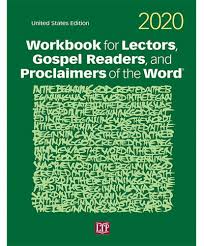|
ST. JUDE PARISH
LECTORS General Principles Reading and Explaining the Word of God When the Sacred Scriptures are read in the Church, God himself speaks to his people, and Christ, present in his word, proclaims the Gospel. Therefore, the readings from the Word of God are to be listened to reverently by everyone, for they are an element of the greatest importance in the Liturgy. Although in the readings from Sacred Scripture the Word of God is addressed to all people of whatever era and is understandable to them, a fuller understanding and a greater efficaciousness of the word is nevertheless fostered by a living commentary on the word, that is, by the Homily, as part of the liturgical action. (General Instruction of the Roman Missal [GIRM], no. 29) Vocal Expression of the Different TextsIn texts that are to be pronounced in a loud and clear voice, whether by the Priest or the Deacon, or by a reader, or by everyone, the voice should correspond to the genre of the text itself, that is, depending upon whether it is a reading, a prayer, an explanatory comment, an acclamation, or a sung text; it should also be suited to the form of celebration and to the solemnity of the gathering. Consideration should also be given to the characteristics of different languages and of the culture of different peoples. (GIRM, no. 38) Scripture Readings The lector is instituted to proclaim the readings from Sacred Scripture, with the exception of the Gospel. He may also announce the intentions for the Universal Prayer and, in the absence of a psalmist, recite the Psalm between the readings. In the celebration of the Eucharist, the lector has his own proper function (cf. nos. 194-198), which he himself must carry out. (GIRM, no. 99) In the absence of an instituted lector, other lay people may be deputed to proclaim the readings from Sacred Scripture, people who are truly suited to carrying out this function and carefully prepared, so that by their hearing the readings from the sacred texts the faithful may conceive in their hearts a sweet and living affection for Sacred Scripture. (GIRM, no. 101) |

